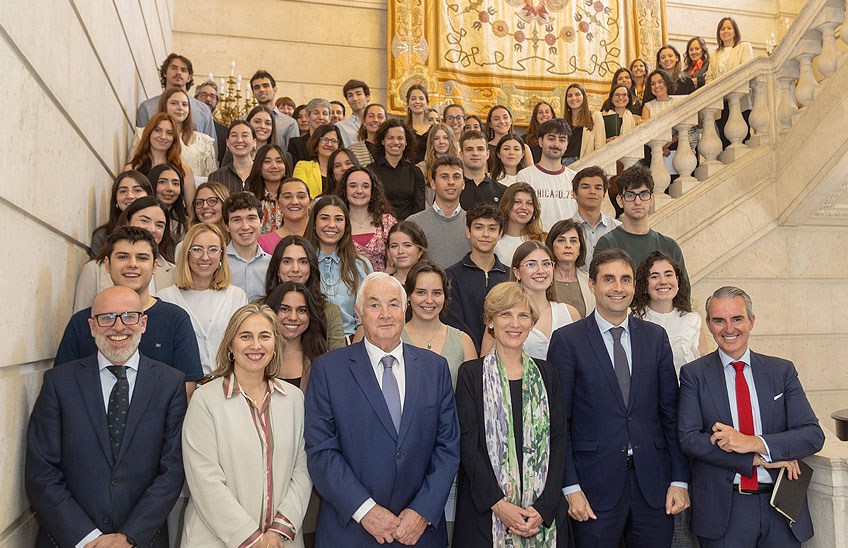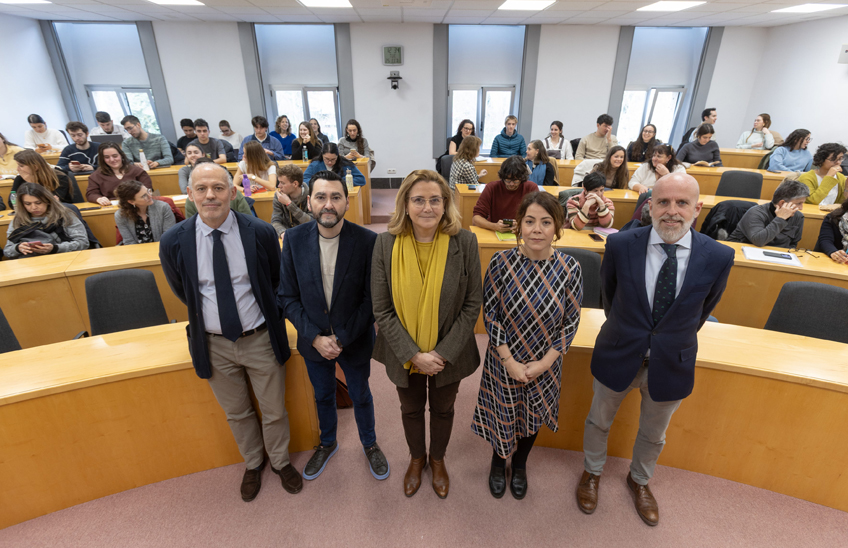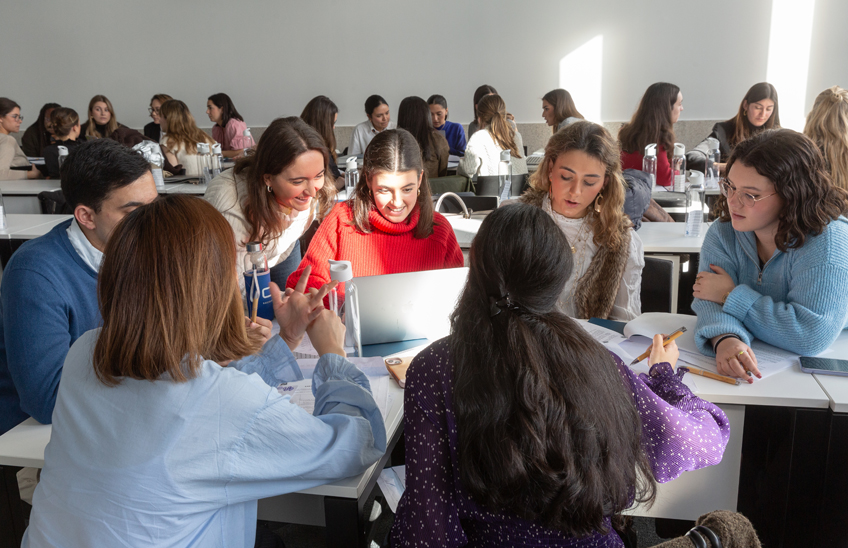The Regional Government, "la Caixa" Foundation and the University are committed to the revitalization of rural heritage with student internships
A new edition of the Revitalizing Rural Heritage program is being promoted, thanks to which, last year, 33 students from the University carried out internships in 19 towns in Navarre
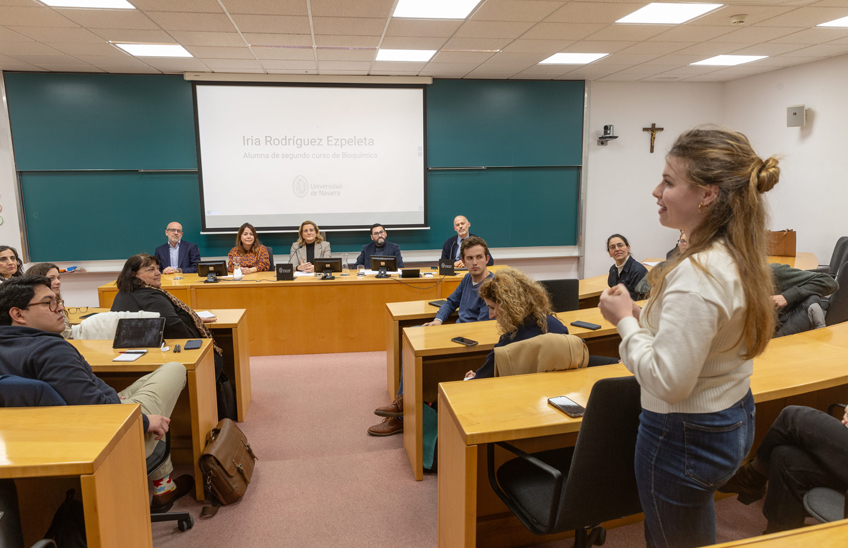
FotoManuelCastells/ A student who did an internship last year thanks to the Revitalizing Rural Heritage program shared her testimony during the second edition presentation
31 | 01 | 2024
The Government of Navarra, "la Caixa" Foundation and the University of Navarra are promoting the second edition of project Revitalizing rural heritage. Through this program, students from different Degrees of the University will be able to carry out internships in rural environments of Navarra.
The Vice President of Students and International Relations of the University, Rosalía Baena; the director general of Local Administration and Depopulation of the Government of Navarra, Jesús María Rodríguez Gómez; the delegate in Navarra of "la Caixa" Foundation, Izaskun Azcona Saldías; and the director of the Internship Service and employment of the University, Alfonso Vericat, presented the project that will be developed between the months of May and September.
The program is aimed at students of Degree, Master's Degree and doctorate of any School or school of the University of Navarra, who have completed at least two years of university programs of study . For the selection of internship destinations, the map of municipalities at risk of depopulation prepared by the General Administration of Local Administration and Depopulation of the Regional Government will be taken into account.
For this edition, the Government of Navarra together with the partnership of "la Caixa" Foundation will allocate 100,000 euros to project, which will enable the realization of internships to about 40 students of the University.
The internships will be aimed at projects that promote three dimensions: natural heritage, with initiatives that seek the preservation, improvement and sustainable use of natural ecosystems; cultural heritage, with projects that seek the rescue and conservation of artistic and intangible assets; and social heritage, with initiatives designed to care for people, particularly the most vulnerable inhabitants of rural areas.
The offers will be published on Portal of employment of the University. The duration of the internships will depend directly on the needs of the institutions and will be remunerated, in order to cover travel and living expenses in the different locations where the internship will take place.
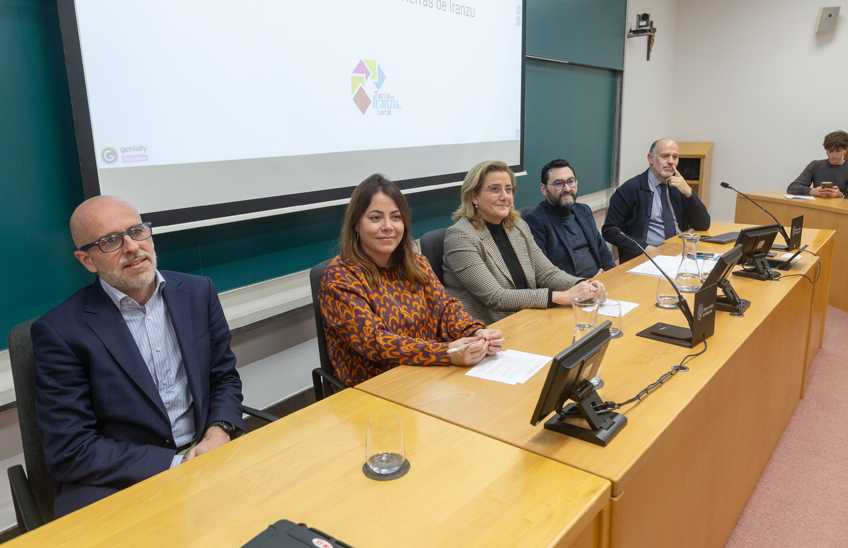
From left to right: the director of the Internship Service and employment of the University, Alfonso Vericat; the delegate in Navarra of "la Caixa" Foundation, Izaskun Azcona Saldías; the Vice President of Students and International Relations of the University, Rosalía Baena; the director general of Local Administration and Depopulation of the Government of Navarra, Jesús María Rodríguez Gómez; and Juanjo Pons, professor of the School of Philosophy and Letters of the University and promoter of the program. Photo: Manuel Castells.
The Vice President of Students of the University of Navarra has highlighted: "This program is the result of a public-private cooperation, through which we can address a social problem such as depopulation. For us it is a great joy to be able to contribute from the University to the contemporary social challenges, at the same time that we offer a educational activity for our students; the rural environment is unknown to many of them and can contribute a lot to them".
For his part, Jesús María Rodríguez, director general of Local Administration and Depopulation of the Government of Navarra, stated that the program seeks to transform and transform disadvantaged rural environments: "It is a clear example of how the partnership between academia and institutions can generate a positive impact in the fight against depopulation, which is one of the priorities of this executive and a fundamental pillar to ensure a sustainable future".
Izaskun Azcona, the "la Caixa" Foundation's delegate in Navarra, also pointed out: "We have an essential goal that permeates all our areas of work: to offer more opportunities to those who need them most. In this sought-after balance, there is also our contribution to the rural development , which is even more important in a region like Navarre. Aging, loneliness, the fragility of public services, difficulties in accessing housing and many other challenges make this also one of the great challenges for the FLC in Navarra".
training at area rural
"Among the main objectives of the program is to bring students closer to the reality and problems of rural areas; the training and acquisition of professional and human skills through the world of work; the impact of the talent that young people bring to rural areas; and the partnership between academia and the agents of the most devitalized territories as tool of social innovation to address the problems that the rural world suffers", explains Juanjo Pons, professor of the School of Philosophy and Letters of the University and promoter of the program.
In the first edition, 33 students from 7 Schools and different schools of the University carried out a total of 42 internships in 19 towns in Navarra. The entities that hosted students were 21, mostly associations and local entities.

